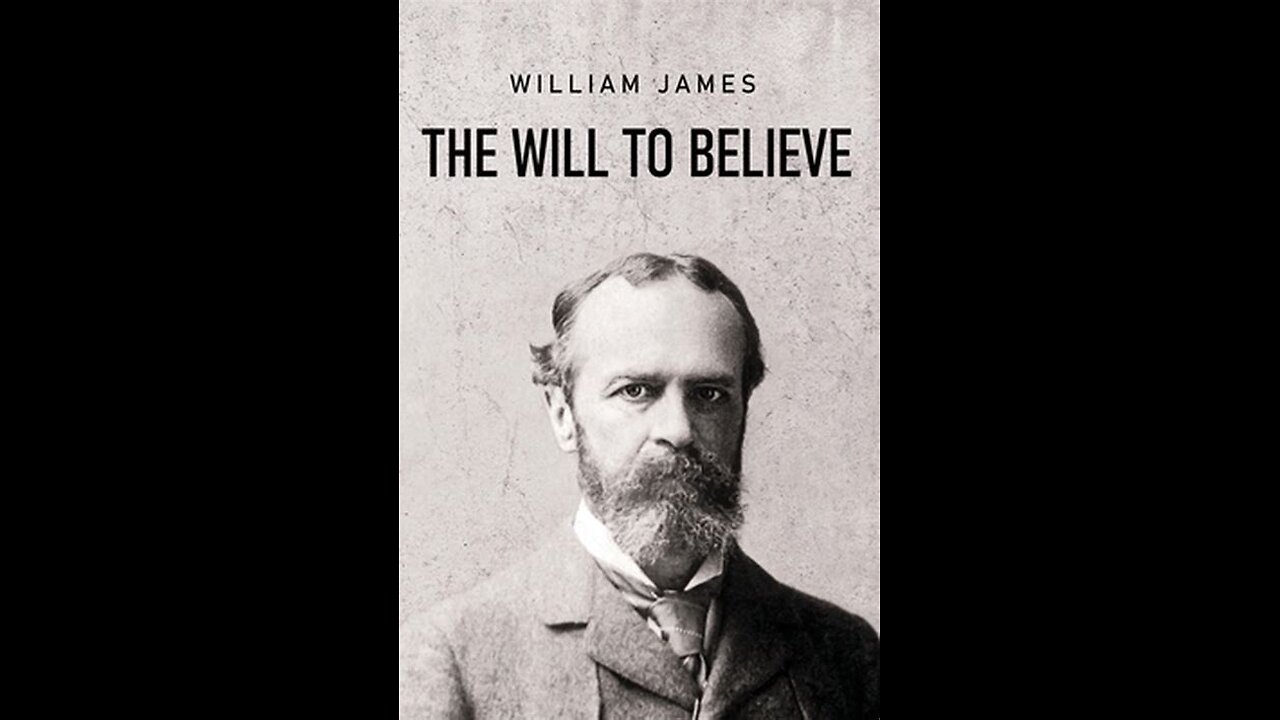Premium Only Content

The Will to Believe by William James | Summary and Critique
Buy Here: https://amzn.to/4a98ePd
"In William James's influential work, ""The Will to Believe,"" readers are taken on a thought-provoking journey exploring the nature of belief, faith, and the role of personal choice in matters of religious and philosophical convictions.
The book opens with James addressing the question of whether it is morally justifiable to hold beliefs without sufficient evidence or proof. He argues that in certain situations where the evidence is inconclusive or insufficient, it is both morally permissible and intellectually legitimate to exercise the ""will to believe."" James contends that individuals have the right to make choices based on personal preference, emotional inclination, and subjective considerations, particularly when it comes to religious and metaphysical beliefs.
James explores the idea that beliefs and religious experiences can have profound impacts on individuals and their lives, contributing to personal happiness, moral guidance, and a sense of purpose. He acknowledges that faith often involves risk and uncertainty, but asserts that such risks are an inherent part of human existence. James encourages individuals to embrace the potential benefits and transformative power of belief, even in the absence of concrete evidence or logical proofs.
Critics of ""The Will to Believe"" argue that James's position on belief and faith may undermine the pursuit of objective truth and rational inquiry. They contend that accepting beliefs without sufficient evidence could lead to the acceptance of unfounded claims or irrational thinking. Critics also suggest that James's emphasis on subjective preference and personal choice may devalue the importance of critical thinking and rigorous intellectual inquiry.
However, supporters of the book commend James's recognition of the human dimension in matters of belief. They appreciate his acknowledgment that individuals are not purely rational beings and that emotional and subjective factors play a significant role in shaping one's worldview. Supporters also value the emphasis James places on personal autonomy, asserting that individuals should have the freedom to choose their beliefs based on their own subjective experiences and preferences.
""The Will to Believe"" continues to be a significant work in the field of philosophy of religion and epistemology. It challenges traditional notions of rationality and explores the complex interplay between belief, evidence, and personal choice. While it has faced criticism, its ideas continue to inspire discussions on the nature of belief, the limits of rationality, and the importance of subjective experience in shaping our understanding of the world."
-
 LIVE
LIVE
Steven Crowder
3 hours ago🔴 Donald Trump vs. Elon Musk: The Massive Battle Over the Big Beautiful Bill
27,041 watching -
 48:55
48:55
The Rubin Report
1 hour agoListen to ‘The View’ Crowd Gasp as Host Starts Lying to Her Co-Hosts Faces
7.02K16 -
 LIVE
LIVE
Akademiks
1 hour agoDay 3/30. Diddy Trial Day 16. Jane Doe to take the Stand. Possibly this is 50 Cent Baby moms?
2,091 watching -
 UPCOMING
UPCOMING
Simply Bitcoin
1 hour agoJoe Rogan Admits Bitcoin Is The NEXT GLOBAL Reserve Currency? | EP 1258
-
 LIVE
LIVE
The Mel K Show
1 hour agoMORNINGS WITH MEL K - Who Will Investigate the Investigators? The Audacity of the Globalist Agenda. It’s Time to Draw the Line! 6-4-25
615 watching -
 LIVE
LIVE
The Dana Show with Dana Loesch
29 minutes agoWATCH: The Dana Show LIVE on Rumble! | WEDNESDAY JUNE 4 2025
281 watching -
 LIVE
LIVE
NEWSMAX
3 hours agoThe Rob Carson Show LIVE (06/04/2025) | Call 1-800-922-6680 | NEWSMAX Podcasts
296 watching -
 41:16
41:16
BitLab Academy
2 hours agoBitcoin Pump Signal (Crypto Supercycle Signal!) Altcoin Market Struggles
101 -

Discover Crypto
2 hours agoBitcoin Supply CRISIS: The ULTIMATE Confirmation for MASSIVE Breakout!
69 -
 LIVE
LIVE
The Charlie Kirk Show
33 minutes agoTHE CHARLIE KIRK SHOW IS LIVE 06.04.25
3,165 watching